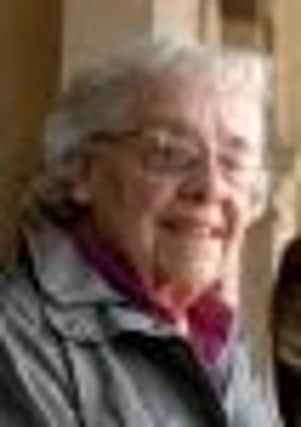Memories of Blitz still burn brightly for survivors


The sounds and smells – the enemy aircraft caught like a “silver butterfly” by searchlights, the soot from burning houses, the shrapnel which fell “like a lot of bricks falling on galvanised tin”, – remain as vivid as ever to Gladys Warriner, 93.
She is one of 20 civilians, who were in Hull during the bombing – which some historians now believe was more intense, per head of population, than the London Blitz – who have recounted their experience for a new booklet and DVD published today, ahead of the 70th anniversary of two nights of intense bombing – the heaviest Hull suffered during the Second World War.
Advertisement
Hide AdAdvertisement
Hide AdMrs Warriner, who had only been married a year, spent many hours in her mother’s brick air raid shelter. While her mother’s sheepdog Laddie stretched out on the bottom bunk, she and her mother sat upright on chairs listening.


She was safely inside when her house got bombed in May 1941 – there were no fatalities directly, but her neighbour opposite was killed when workers pulled out a couch which had been holding up the rubble above the cellar where he’d been sheltering. “A lot of things like that happened, but you couldn’t prove it,” she said, adding, “Your priorities were different.”
She thanked her lucky stars. “I had two velour armchairs, one was right opposite the window and there were big shards of glass stuck in the back, so if I had been sat there...”
And she had the prospect of getting replacement furniture – utility but really well made – and her husband home from the Army for seven days’ leave.
Advertisement
Hide AdAdvertisement
Hide AdMrs Warriner, who lives only a few streets from where she grew up as a child, has crystal clear recollections her time as a plate layer on the railways in Hull. She soon learned that sleepers weren’t for sleeping on and “horns” were for lifting rails.


It was hard, physical labour, laying new line, making repairs, shovelling coal, and worst of all, weeding tracksides, but though petite she was strong as an ox: “We had to get on with it; everybody accepted it. If a shop got bombed some clever notice would go up on it; at teatime you were getting ready to go into the shelter. It was an experience. It bought me out a lot.”
The screaming bombs wound everybody up. “Mrs Hutchinson used to say: “It’s hitting us, it’s hitting us” and get everybody in a panic, it really got my goat. Thank God we didn’t get many of them.”
Once she saw her searchlight unit home in on an enemy plane: “It was beautiful, it just looked like a silver butterfly; it was a real pretty sight.”
Advertisement
Hide AdAdvertisement
Hide AdJohn Phillips, who now lives in Hollym, was just five when war broke out in 1939, but despite being in one of the worst hit areas of the city – few weren’t, nearly 95 per cent of buildings in the city were damaged or destroyed – she wasn’t evacuated.
“I remember my father turning round and showing me a parachute coming down and saying get round the shelters quick, tell everyone there’s going to be an awful bang. It was a landmine.”
For years after the war his father kept a souvenir to hold pokers by the fireside – two shells which had been filled with black sand. “Someone said they were Yugoslavs, forced labour in a factory. They had been filled with black sand that didn’t detonate to try and do their bit against the war.”
Children going to school competed to see who could gather the most shrapnel – and one lad was allowed to wear a hat at school, after his hair fell out after a bomb dropped on his house. He remembered: “We lived at 18 Charlotte Terrace, Mr and Mrs Smith at number 19 got a stick of incendiary and it gutted their house and we has to move to number 17 because it was so badly scorched – but that was nothing to Anlaby Road – that was devastated.”
Advertisement
Hide AdAdvertisement
Hide AdTHERE is a war on you know – Life through the eyes of children living in the Sculcoates area of Hull during the Second World War”, a 28-page booklet (£3) and 80-minute DVD (£12) by Mike Ulyatt is available from 28 Blackthorn Lane, Willerby, HU10 6RD or by calling 01482 657200. Any profits will go to Dove House Hospice.